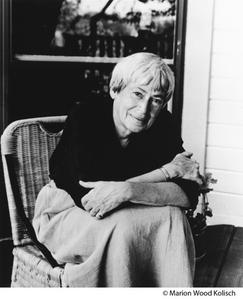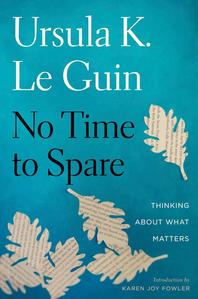
Ursula K. Le Guin is best known as a writer of fantasy and science fiction, so her latest book may come as a surprise. No Time to Spare is a collection of her blog entries, mostly written between 2010 and 2015. It's a prescription for paying undivided attention to things, as a way to discover, imagine and love.
Inspired by Taoist philosophy and influenced by her anthropologist parents, the pieces range from feisty critiques of capitalism and literary trends to quizzical musings about her cat, Pard, the ultimate alien intelligence. The book's subtitle is Writing About What Matters, and if we are to learn anything from Le Guin, it's that you don't often have to look far for what matters most; you just need to look with care.
What still surprises you about (or in) your writing?
Well, these days it surprises me that it still happens at all. And it doesn't happen now as often as I'd like. But after all, there's always something to write....
The hero of your new book--if it can be said to have a hero--is a cat named Pard, whom you regard quizzically and with apparent delight. In that same vein, who or what might you say is the villain in this collection?
I never have gone in very much for villains in my fiction, but I guess you could say the villain of this collection is the hero of growth capitalism--The Corporation and the people who sell out to it.
Who do you write your blog for? Do you ever read the comments, and if so, what do you learn from them, if anything?
I write them for anybody who wants to read them. (Writers live in hope.)
Yes, sure, I read all the comments. They're mostly good-natured, and some are thoughtful and enlightening.
You say that dystopian literature is yang-driven, and its opposite--utopian literature--is also yang-driven. Is there a literature that presents a realistically complex vision of a world in balance? Or is that just fantasy?
Of course it's just fantasy. That's why I write fantasy. What works of fantasy present a realistically complex vision of a world in balance (or of female solidarity)?
What works of fantasy present a realistically complex vision of a world in balance (or of female solidarity)?
Trying to think about this, I realized that I was not coming up with any fantasy that presents a realistically complex vision of a world in balance, maybe because we are so unbalanced at this point that imagining a real balance, even if fantasy, is not possible.
As for a world of feminine solidarity, that is questionably desirable: solidarity is something you call on in defense or when attacking. I would like to imagine a world of genuine equality, without stupid gender wars and battles of the sexes, where women did not have to consolidate against men or vice versa. I tried to sketch such a world in The Dispossessed. But I don't think I could write that book now.
How much of the selection in No Time to Spare was your choice versus your editor's? What surprised you in the process of collecting these pieces? What emerged in the selection and ordering of these pieces that you hadn't noticed before?
My editor, Naomi Gibbs, had much more to do with the choices than I've usually allowed or asked an editor for. In fact, I dumped most of the selection and arrangement on her. I figured she knew better than I did which pieces would best survive the transformation from time-sensitive blog to printed essay. If she pulled any big surprises on me, I mostly liked them.
What underappreciated or forgotten writers or books are you a proselytizer for (any genre/form)? Which new or up-and-coming writers whom you've read lately would you recommend?
I beat the drum and blew the horn for imaginative fiction during the decades when the critics and professors restricted Literature to modernist realism. Jericho finally heard the trumpet, and so now the old science fiction ghetto is getting gentrified beyond recognition.
I'd beat the drum like crazy for graphic novels if so many of them weren't either orgies of meaningless violence or recitals of life's cruelty to the author. But it's a lovely form. It'll grow up.
To be honest, I read very little of the up-and-coming, because at 88 I get more out of rereading the old-and-still-going. Rereading a good novel or poem is a great source of revelation and pleasure.
What novels (or poets) do you most frequently return to for revelation and/or pleasure?
Austen through Yeats, inclusive. I can't think of a Z writer--Yes! Zamyatin!! --Zak Nelson, writer and bookseller

